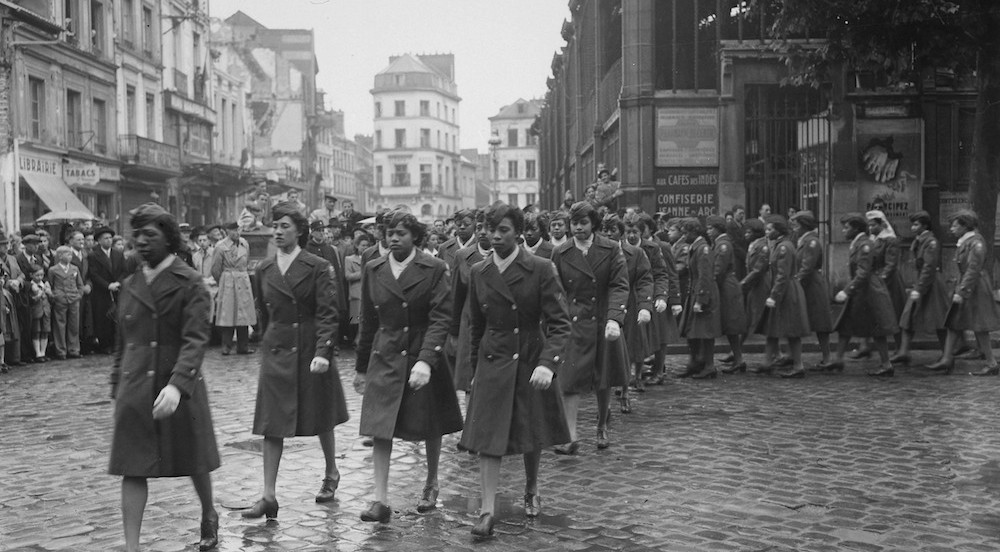On Monday, the House voted to award the Congressional Gold Medal to the only all-female, Black military unit who served in Europe during World War II, NBC News reports.
The unanimous, 422-0 vote follows a long campaign to recognize the achievements of the 6888th Central Postal Directory Battalion. The unit, also known as the Six Triple Eight, was responsible for routing and sorting mail for millions of American service members and civilians. Only six of more than 850 members are still alive today.
Like other Black units that served in the military during World War II, the remarkable accomplishments of the 855 members of the battalion have largely been forgotten until recently.
“It’s overwhelming,” Maj. Fannie Griffin McClendon, who is 101 and lives in Arizona, said when told of the vote. “It’s something I never even thought about it. I don’t know if I can stand this.”
“The Six Triple Eight was a trailblazing group of heroes who were the only all-Black, Women Army Corps Battalion to serve overseas during World War II,” said Wisconsin Rep. Gwen Moore, who sponsored the bill after being contacted by Anna Mae Robertson, the daughter of a 6888th member.
“Facing both racism and sexism in a war zone, these women sorted millions of pieces of mail, closing massive mail backlogs, and ensuring service members received letters from their loved ones,” she continued. “A Congressional Gold Medal is only fitting for these veterans who received little recognition for their service after returning home.”
The 6888th Central Postal Directory Battalion was dispatched overseas in 1945, during a time when African-American organizations petitioned the government to allow Black women to join the Women’s Army Corps and allow them to join white women overseas.
The 6888th Central Postal Directory Battalion was also credited with helping to solve the mail crisis that was taking place in England. They cleared out a backlog of about 17 million pieces of mail in three months which was half the time projected. When they returned home from service, they inspired generations of Black women to serve in the military.
In 2018, a monument was erected at Fort Leavenworth, Kansas in their honor, and the 6888th received the Meritorious Unit Commendation in 2019. Their exploits were featured in the documentary “The Six Triple Eight.” Retired Army Col. Edna Cummings has been of the fiercest advocates of the 6888th.
Also, The House voted on Monday to rename the Central Park Post Office in Buffalo, NY as the “Indiana Hunt-Martin Post Office Building” after veteran Indiana Hunt-Martin, who was a member of the 6888th. Hunt-Martin passed away in 2020 at the age of 98.
“Throughout her life and military service, Indiana Hunt-Martin experienced racism and sexism firsthand, but no amount of discrimination prevented her from serving her country,” New York Democratic Rep. Brian Higgins, who sponsored the post office bill and also was a co-sponsor of the Congressional Gold Medal bill, said in a statement. “Her courage and bravery paved the way for future generations of African American women serving in the military.”
Many of the women in the regiment went on to successful careers after leaving the unit.
Elizabeth Barker Johnson became the first woman to attend Winston-Salem State University in North Carolina on the GI Bill. She took part in the school’s commencement exercises at the age of 99, 70 years after getting her degree. She worked for the New York State Department of Labor for 41 years.
Maj. Fannie Griffin McClendon joined the Air Force after the military was integrated and retired in 1971. She was the first woman to command an all-male squadron with the Strategic Air Command.
The late Doris Moore, another unit member, was the first Black social worker in New Hampshire.
“This is a long-overdue honor and recognition for the women of the Six Triple Eight, including New Hampshire’s own Doris Moore,” New Hampshire Democratic Rep. Chris Pappas said in a statement. “Doris and her sisters in arms were trailblazers and patriots who answered the call to service. It’s even more remarkable that their sacrifice and service in defense of freedom came at a time when many of the very freedoms they fought for were not yet available to them.”













